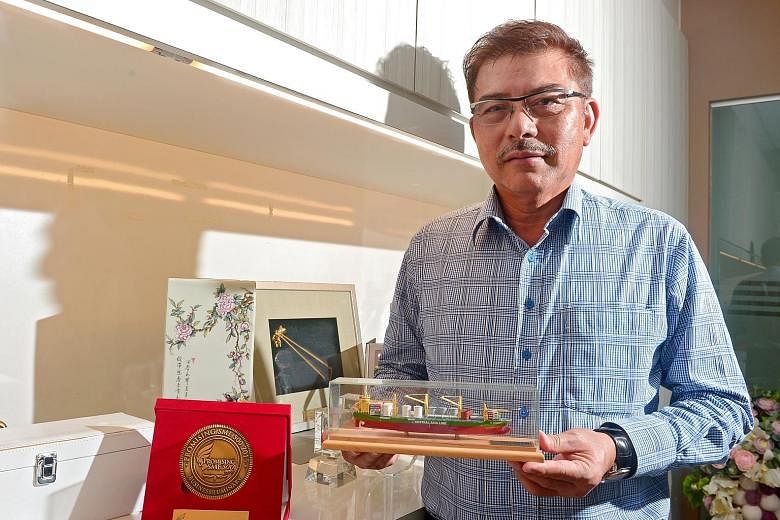Q Can you tell us about Altron Shipping and what it does?
Mr Leo We are a freight forwarding company established in 1997. Through the years, we have grown from a small team of five to become one of the industry's main players with around 70 people, which is quite large for a home-grown firm.
Mr Se Our services have a world- wide reach and, together with 40 agents and eight partners, we provide our clients one-stop solutions to freight shipping - from Customs paperwork and cargo logistics to warehousing - to some 15 ports in Asia and another 20 or so in other regions. The volume we ship averages at about 50,000 to 60,000 cubic metres annually.
Q How are you faring as the global economic slowdown drags on?
Mr Leo Since our founding, we have been able to grow our revenue every year at a rate of around 10 per cent annually. In 2014 and 2015, despite the headwinds, we managed to pull in $20 million to $25 million, up from $16 million before that.
We are hoping that this year, we can do the same, but honestly 2016 is going to be quite soft - potentially even worse than the 2009 financial crisis.
And when an economic crisis hits, the first thing everyone does is to slash rates, so not only the volume might slow, but also there's greater cost competition.
Q What's your plan to maintain your business growth?
Mr Leo The cost competition in our industry is a bit of a chicken-and- egg situation - if you can't grow your business, your cost will just keep going up.
So it's important that we view crisis as opportunity and not let the challenges get in the way of what we want to do, which is to maintain that 10 per cent or so annual growth.
That means a few things. First, we must keep our people and the unity within Altron, because this is fundamentally still a people business. So we have never, and hopefully never have to, retrenched anyone.
And we have continued to upgrade our capability and profile. Last year, we acquired the ISO 22301 certification for business continuity management.
Q What does the certification mean, and how does it help you?
Mr Se Simply put, it shows that a company has a very high level of risk management ability, that it can minimise the chances and damage of a crisis situation that will disrupt its business services, such as fire hazards or IT system breakdowns.
For us, it means all our employees are trained to anticipate these events and still remain functional. We have also designated an alternative office which houses our secondary IT infrastructure.
The result is that we can provide minimum services in two man- days after a disaster, down from 17 previously.
If there is a breakdown, our IT infrastructure can be recovered within one man-day, down from 10 man-days previously.
Mr Leo What's also important is that it raises our company profile and gives assurance to the clients. For local firms, the ISO 22301 certification is still uncommon but it's often required by multinational clients. We can now compete for their contracts more easily.
Q How much effort went into getting the ISO 22301 recognition?
Mr Leo We already have other certifications, including ISO 9001 and ISO 28000, but ISO 22301 is much more comprehensive than all that, and naturally the process was quite stringent.
Mr Se The project started in June last year and over the course of around three months we had to send all our staff to a full-day training course in batches of 20 people.
I think the company lost around 10 man-days due to the training, which was quite a challenge because ours is a non-stop business. In all, the project cost us at least $20,000. But getting the recognition is just the start. There's annual auditing to be had, and in fact we are now preparing for the external audit next month.
Q That sounds like a lot of commitment.
Mr Se But it's very necessary. Having the certification strengthens our corporate image and profile, which is what a lot of clients look at among the mid-size providers beyond the cost concerns.
It has other benefits. Because of the challenging environment, many of our clients have cut their people.
As a form of outsourcing, we are able to send our staff to be seconded at clients' companies to handle various shipping needs. They know our people can do that because our certifications tell them how well-trained our people are. All this must be part of the package that we sell to tie the clients down.
Q How else do you plan to stay competitive against the headwinds?
Mr Leo A key part is that we must adapt quickly to the rapid emergence of e-commerce. This has profound impact on the patterns of shipping. As traditional retailing sees less demand, fewer merchants are holding buffer stocks in their warehouses and this affects the model and costing of bulk shipping.
Mr Se In the coming years, this is going to be one of our main focuses. We are just starting to understand how to adapt. Likely this will involve further upgrades of our IT systems. In time to come, we may start offering door-to-door delivery services. We're already looking for partners for that.


